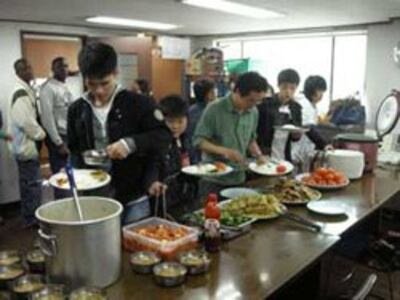SEOUL—Children and young adults who defect to South Korea from the Stalinist North often face a long battle in adapting to life—and education—in a capitalist country, educators say.
And many arrive in the South having spent several years without schooling in a third country.
But a growing number of alternative schools in South Korea are being set up to bridge the gap.
"[Our] program is customized for young North Koreans," Lee Young-Seok, instruction team leader at the Hankyoreh Alternative School for North Korean Youths, said. The school is run by the nongovernment Citizens' Alliance for North Korean Human Rights.
Located on the campus of Korea Christian University in Seoul's Hwagok district, the school began its 16th session in December, with around 20 North Korean students enrolled, aged from 8-20. Sessions, which last from two to three weeks, are held during the summer and winter breaks of regular schools.
"We provide [our students] with a diverse curriculum, including education for democratic citizenship," Lee said.
"Above all, our most important goal is to help them grow more self-confident."
Choi Ok, himself a North Korean defector, is principal of the One Nation Alternative School for North Korean Youths in the Yangchon-gu district of Seoul.
Four years ago, he arrived in South Korea after escaping from the North.
A challenging job
"This is a challenging job," he said. "Besides teaching, the principal has to manage students, parents, and teachers, and has to do a lot of fundraising as well. I focus a lot on managing our teachers."
Choi said young North Korean defectors find it hard to focus on their studies after arriving in the South.
"They don't have the money to pursue an after-school education at private institutions," he said.
Many defected through China, where they faced starvation and the constant fear of repatriation by Chinese police.
"They had no opportunity to go to school," Choi said, "[so] we generally teach them elementary and middle school material."
"We teach them subjects including Korean, mathematics, English, fine arts, morals, and computer science."
The greatest difficulty the students face is language, he said.
"Even the specialized vocabulary used in geometry is different in North and South Korea: for example, the names of the various trigonometric functions. And that makes it even more difficult for them to attend school in the South," Choi said.
Cultural differences

As well as having to catch up with years of missed schooling, young North Koreans also find huge cultural differences between North and South Korea, along with a social stigma attached to their identity as defectors.
Kim Ki-young, now 18, was expelled from school for fighting after being bullied by his South Korean classmates.
"The reason why I didn't learn much in school was that the South Korean kids bullied me a lot, and I got into a lot of fights," he said.
"I even fought with my teachers, and that's why I got expelled so many times. It was very, very hard."
Kim said he didn't even know how to write the Korean alphabet when he first arrived in the South, having had only one year of schooling before leaving the North.
"In order to make up for the time I've wasted, I intend to take my high school entrance examination and go through high school all over again," he said.
His situation is shared by many young North Korean adults, and the alternative schools springing up around South Korea address the need for older pupils to take elementary classes from scratch.
'Over the moon'
Kim Eun-Joon prepared for her college entrance exams at an alternative school to get around the age-gap problem.
"I am over the moon, now that I've been admitted to college," she said. "I was older than my South Korean classmates in high school, and life was not easy, but everything is going to be O.K. now that I'm in college and I can pursue my goals and dreams."
Another North Korean student, who resettled in the South last year, said the differences between the two education systems were the biggest barrier for her.
"Mathematics, physics, and history are taught differently in South and North Korea," Kim Soo-kyung said. "There are a lot of things I didn't learn in history class in North Korea."
"In South Korea, unlike North Korea, we learn a lot about ancient history in our classes. I find it very interesting," she said.
Kim Soo-Kyung said she finds it hard to adapt to her new life, but said she still sees hope for the future.
"There is no freedom in North Korea," she said. "In South Korea, there is ample opportunity to succeed if one works hard. That's what I like the most about my new life in South Korea."
'A tough time'
Defector Lim Keum-Hee, 20, had hoped to arrive in the South, where she joined her mother after 13 years' separation, and simply start work.
"After arriving in South Korea, I realized that there was so much I didn't know, that my ignorance made it hard to have even a regular conversation with my South Korean peers," she said. "I had a very hard time."
She quickly realized her plan to make money wouldn't fly without an education. "So, I changed my mind and decided to attend school. But I'm 20 years old, and attending elementary school is completely out of the question at this age."
"I chose to join a class for high school entrance examination preparation at the alternative school instead. I am confused and don't know where to go or what to do. I am having a very tough time," she said.
But Lim said she would persevere in order to honor her mother.
Original reporting in Korean by Sookyung Lee, Si Chun, and Jung Young. Korean service director: Francis Huh. Translated by Grigore Scarlatoiu. Written for the Web in English by Luisetta Mudie.
